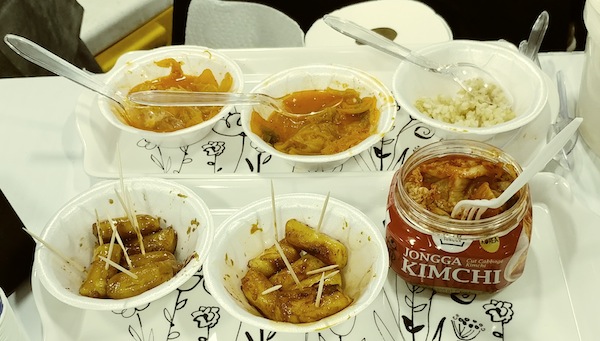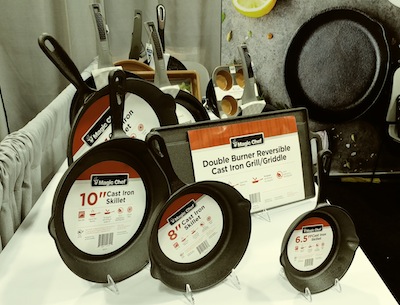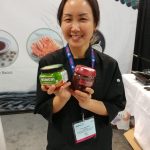My family enthusiastically eats huge salads at dinnertime in the summer. We love to celebrate the fresh local lettuce and other vegetables we receive from our community-supported agriculture (CSA) share. A CSA is a membership/subscription service that allows farms to directly market to customers. A CSA membership pays the farmer in advance to buy seeds and cover other costs. In exchange, the member gets a share of the farm’s products. Most CSAs are for vegetables in season. There are also many other sorts of CSAs, including for grain, meat, cheese, eggs, and more.
We’ve had a farm share nearly every summer for more than 20 years. Some weeks, our share is huge, full of delicious seasonal delights. Perhaps we get tomatoes, basil, peppers and eggplant at the height of summer, or enormous heads of springtime lettuce. This membership model depends on relationships between the farmer, the customers and the growing season, with a bit of luck sprinkled in. Sometimes, the CSA enables us to experience the challenges of a farm’s drought or flood. Other years, we’ve eagerly distributed rhubarb, beets, or squash around our neighbourhood when we’ve been overwhelmed with produce.
We also buy a “freezer lamb” and a quarter of beef (a quarter of a steer), along with farm-raised chicken. This is where our “eat local” mantra conflicts with traditional Jewish practice. Everyone used to depend on local butchers. Having a kosher butcher nearby meant eating local foods that were butchered according to the laws of kashrut. As modern health regulations and slaughterhouses developed, small-scale butchers, including local kosher butchers, became less common. Now, it’s nearly impossible to get fresh kosher meat anywhere outside of large urban areas with a big Jewish population.
In the Jewish community of Winnipeg, where we live, the city’s kosher butchers were well-known. According to historians Arthur Chiel, Allan Levine and Rabbi Moishe Stern, there was even a congregation here, Beth Judah, or “the Butcher’s Shul,” from 1937 to 1971. The butchers, and their Retail Kosher Butchers’ Association, had a lot of power in the 1930s and 1940s, occasionally running into conflicts with Winnipeg’s rabbis.
Given this history, it’s sad that there are no longer any kosher butchers here. A few years ago, a newcomer shochet (butcher) friend from Hungary collaborated with the Winnipeg Chabad. They butchered turkeys to provide fresh kosher meat. It was a difficult proposition, even though the provincial regulators tried to help. We were one of the families who tried to support him by buying a kosher-butchered turkey. It didn’t become an ongoing business venture.
Jewish diets worldwide have been shaped by what’s available locally, what’s affordable and how to make it kosher or maybe just “kosher style.” Traditional or noteworthy food choices change over time. Our diets are influenced by our families and communities of origin, even beyond issues of kashrut. Whether our relatives came to Canada from Russia, Ethiopia or Yemen, kashrut is part but not all of our cultural food choices.
As a younger married couple, we ate lots of local fruits and vegetables, even growing some ourselves. A few years after we married, we heard scary family news. My husband’s first cousin was younger than we were, but her (also young) husband had been rushed to the hospital for an emergency medical procedure. He had serious blockages in his arteries that needed immediate intervention. We lived far away and weren’t sure how to help. We discussed it over dinner and formulated a plan.
The family of this “cousin-in-law” kept kosher. He ate a steady diet of Eastern European specialities. Lots of holiday meat meals, plenty of dairy, very well-cooked vegetable side dishes. Salads were heavy on fattening dressings. This young guy also ate well. (Jewish grandmothers approved!) We looked at the summertime salads and vegetarian meals in front of us – as undergraduates, we attended Cornell University, in Ithaca, N.Y., where the famous Moosewood Collective has specialized in vegetarian cuisine for many years. I ordered a bunch of Moosewood cookbooks to be sent to this cousin’s house with a get well note.
Twelve years ago, we gathered in Florida for a family vacation meal. I was pregnant with twins and surrounded by this couple’s young kids. We heard that the medical intervention probably saved his life. They changed their diet entirely to be more “heart healthy.” The cookbooks helped.
Integrating a foodie’s enthusiasm with locally produced, healthy foods with Jewish practice can result in discord, though. I’ve been told that the “only way” to get some special items is to arrive at the farmer’s market early on Saturday morning. There’s no alternative if I’m going to synagogue instead. I shrug and suggest that they consider other sales venues, too. At the same time, my choice of locally raised (but not kosher-butchered) meat results in divisions around the Shabbat table, too, as some people won’t eat at my house, even if I only serve vegetarian foods to them.
For those whose level of kashrut is very strict, some won’t eat fresh berries or broccoli due to the chance of ingesting a bug, which would not be kosher. My husband is a biology professor who studies bugs. We’ve had some interesting conversations about this. One of our favourite consultations involves a busy Chabad rabbi and his wife who run wonderful youth programming. Occasionally, they send my professor husband photos of insects to ask, “What is this?” and “How should I get rid of it? Should I throw away the flour?” as they manage their kosher home.
Embracing ethical food choices can be an important expression of one’s Jewish practice. It goes beyond kashrut, whether it’s choosing to donate to Mazon Canada (the Jewish response to hunger) or foodbanks, growing a garden or buying local produce. We express our values through what we eat, as well as care for our health and the earth. That effort feels like an important (and Jewish) thing to do. Finally, the Israeli thing to do would be to wish you a hearty appetite or b’tayavon! May you enjoy whatever you eat!
Joanne Seiff has written regularly for CBC Manitoba and various Jewish publications. She is the author of three books, including From the Outside In: Jewish Post Columns 2015-2016, a collection of essays available for digital download or as a paperback from Amazon. Check her out on Instagram @yrnspinner or at joanneseiff.blogspot.com.







